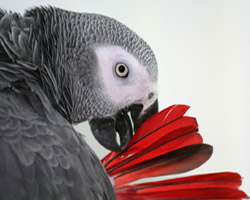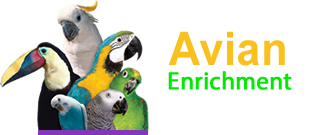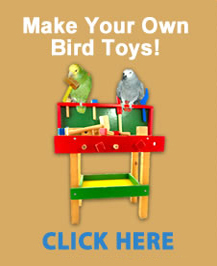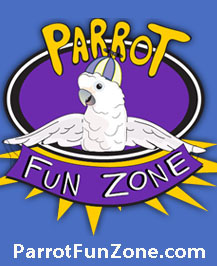A Parrot's Need for Mental Stimulation
 In the wild, parrots are challenged mentally every day just in their quest to find food and avoid predators as well as in their interactions with their flock mates.
In the wild, parrots are challenged mentally every day just in their quest to find food and avoid predators as well as in their interactions with their flock mates.
In nature, food is rarely available in such quantity that a parrot can satisfy it's needs without expending considerable effort. To be efficient and productive it requires planning and skills. Foraging requires the ability to recall locations of prime foraging sites. Birds rely on memory and positional mapping skills so they can head to foraging areas where food is available, rather than aimlessly searching around.
They also have to be able to interpret environmental cues and have a sense of seasonal timing to insure the food is ripe and ready for the taking. Once the food is found, they often have to be able to open and retrieve the food from within tough shells or fruit pods.
Predator avoidance also requires heightened mental awareness and finely tuned senses. Parrots have to be able to quickly process visual and auditory data in order to escape being another animal's dinner.
In general, the smarter an animal is, the more likely they are to have a social nature. Participation within a flock and social interactions require a different set of abilities such as the ability to recognize individual members of the flock, the ability to communicate, play and participate in cooperative behaviors.
Contrast a parrot's natural existence with one in captivity where they sit behind bars most of the day without the opportunity for exercise, interaction, or even "jobs" to do and where once a day clean "fast food" and water is delivered. This scenario has lead many birds to a very unhealthy and unhappy existence characterized by a host of behavioral issues (screaming, feather destruction, aggressiveness).
Do you want a Brainiac or a Maniac?
The more intelligent a being is, the more environmental and behavioral enrichment is requisite to their well-being. Parrots have been described as having the intellectual capacity of a 3-5 year old child. For more information on the intellectual abilities of birds check out our article: The Amazing Bird Brain.
With this recognition of their intellectual capacity, it's is imperative that bird owners take action to meet their need for daily mental stimulation. This can be accomplished by affording them with new opportunities for exploration as well as exposure to new situations and new people. Specific suggestions include:
- Providing a wide variety of toys including
- foraging toys
- destructible toys
- puzzle/manipulative toys
- teach & learn toys
- Rotating and changing out toys weekly.
- Playing interactive games with your bird.
- Introducing new foods in new ways.
- Training birds to learn new words, phrases and songs.
- Talking to your birds in context.
- Training your bird to do tricks.
- Introducing your bird to new environments and people by taking your bird on outings.
If you think creatively you can make your bird's environment and daily experience interesting, challenging and fun !







Comments powered by CComment